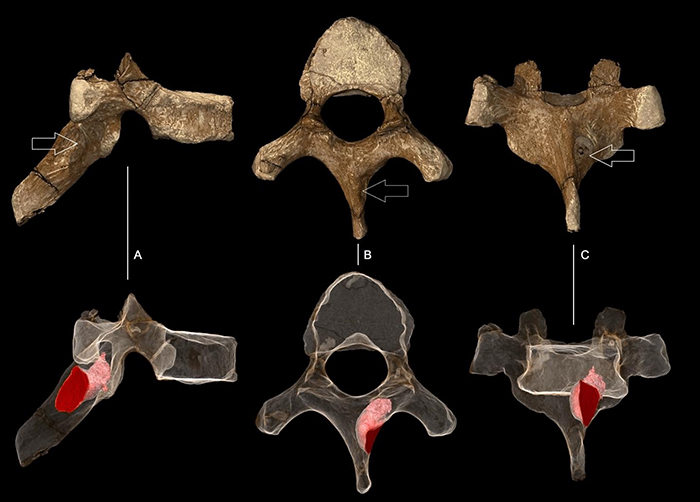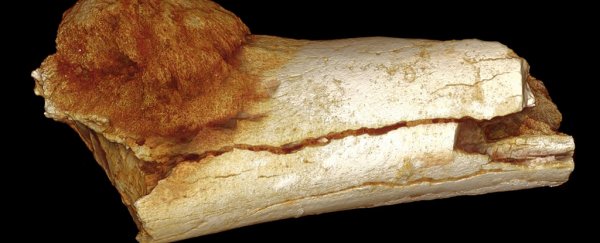Human beings have been battling cancer for at least 1.7 million years, according to a fossilised human toe bone that's just been unearthed in South Africa.
The specimen shows signs of an aggressive type of cancer called osteosarcoma, and could help us figure out how the disease affects us even today, suggesting that some cancer triggers are buried deep within our evolutionary past, and aren't all related to our modern lifestyle.
"Modern medicine tends to assume that cancers and tumours in humans are diseases caused by modern lifestyles and environments," says one of the researchers, Edward Odes from the University of the Witwatersrand in South Africa. "Our studies show the origins of these diseases occurred in our ancient relatives millions of years before modern industrial societies existed."
Researchers from the University of the Witwatersrand and South African Centre for Excellence in PalaeoSciences say they don't yet know if the foot bone belonged to an adult or a child, or if the cancer resulted in the person's death, but suggest that it would have affected their ability to move, and likely caused them a lot of pain.
An accompanying paper, written by several of the same experts, outlines the discovery of a bony tumour from the same site, and this one's even older - approximately 1.98 million years old. But unlike the toe bone, this cancer appears to have been benign.
Until now, the earliest sighting of a benign bone tumour was in a fossil some 120,000 years old, so thanks to this new finds, that record has been well and truly smashed.
What's interesting about this benign, but abnormal, growth (identified as osteoid osteoma) is that it was found in the vertebrae of a 12- or 13-year-old. We've never seen fossilised evidence of this type of disease in a child before, and in modern times, it rarely occurs in the spine, making this a very valuable find.
Both bones were dug from caves in the Cradle of Humankind in South Africa - a World Heritage site, and a rich source of fossils, stretching back through the history of humankind. Advanced 3D-imaging techniques were used to scan the bony fossils and find evidence of tumour growth.
The idea of cancers as a relatively recent health hazard is based largely on studies of Egyptian mummies, where no tumours have been detected, reports James Gallagher for the BBC.
But even if cancers are as ancient as humans themselves, there's no doubt that parts of the modern lifestyle (like smoking) can increase the risk of the disease.
Researchers will now need to reassess the balance between how many cancers are caused by unhealthy living, and how many are simply the 'bad luck' of gene mutations, a topic that has caused some debate in the past.
"You can opt for the Paleo diet, you can have as clean a living environment as you want, but the capacity for these diseases is ancient, and it's within us regardless of what you do to yourselves," Odes told Mark Strauss at National Geographic.
At least now we know that our distant ancestors suffered from some of the same problems we do, and if we can figure out how this form of cancer started, we might be better placed to stop it.
The findings have been published in the journal South African Journal of Science.
 Child vertebra affected by a benign tumour. Credit: Paul Tafforeau (ESRF)
Child vertebra affected by a benign tumour. Credit: Paul Tafforeau (ESRF)
